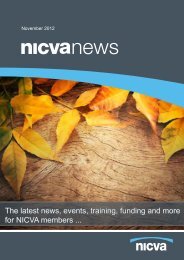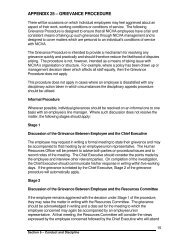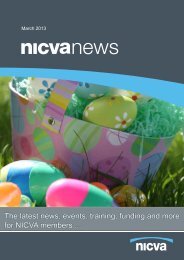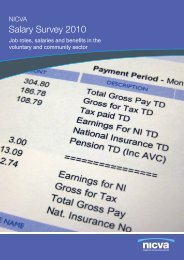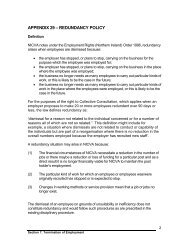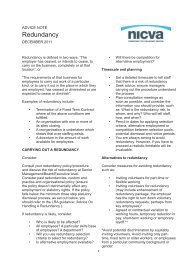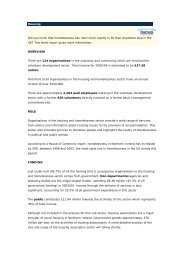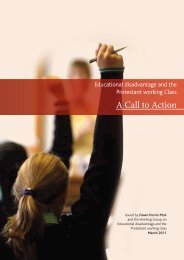APPENDIX 13 â SICK LEAVE AND ALLOWANCES - Nicva
APPENDIX 13 â SICK LEAVE AND ALLOWANCES - Nicva
APPENDIX 13 â SICK LEAVE AND ALLOWANCES - Nicva
You also want an ePaper? Increase the reach of your titles
YUMPU automatically turns print PDFs into web optimized ePapers that Google loves.
In order to provide managers with appropriate information about an employee's ability to<br />
perform all or part of their job tasks, and particularly in cases of long-term or excessive<br />
or persistent absence, NICVA may refer employees to an Occupational Health<br />
Practitioner. The purpose of the referral is to obtain information about an employee's<br />
condition which is necessary as part of the process of consulting with the employee and<br />
managing the absence.<br />
Typical situations where NICVA may refer to an Occupational Health Practitioner are<br />
when a prognosis is needed in relation to an individual's ability to return to work, an<br />
employee is nearing the end of their paid sickness entitlement, where stress may be a<br />
factor and where an additional medical opinion may be useful to the employee.<br />
All referrals will be made by the Manager and any information or correspondence<br />
relating to the case will be shared with the employee and will include NICVA obtaining<br />
consent from the employee for access to the relevant medical reports. However, by<br />
their nature, no two sickness absence cases are alike and therefore it is impossible to<br />
devise clear rules as to when referrals will take place.<br />
Return to Work Meetings<br />
On an employee's return to work following an extended period of sickness absence, the<br />
line manager will meet with the employee to discuss the reason for the absence and the<br />
progress of work in their absence. There may be exceptional circumstances when the<br />
manager will be requested to respect the confidential nature of sickness absence which<br />
will mean the employee is unwilling/unable to discuss the reasons for the absence. In<br />
these situations the manager is required to establish as a minimum whether the<br />
absence is in any way attributed to work or a result of work related injury. This meeting<br />
is essential for a number of reasons:<br />
(1) To ensure that the employee is fully informed of and kept up to date on issues<br />
within their unit of work.<br />
(2) To enable managers to identify at an early stage and take account of any<br />
sickness absence related problem areas which could have an impact on other<br />
employees’ work.<br />
(3) To ensure the employee has fully recovered and that appropriate steps are<br />
taken to ensure they are rehabilitated back to work.<br />
(4) To complete their sickness absence record form.<br />
All details discussed during the meeting will be held in strict confidence.<br />
Managers should be aware of the possibility that a disability or a disabling or terminal<br />
illness might be a cause for absence. If this is known or becomes apparent during a<br />
return to work meeting, the matter must be treated very sensitively and will require<br />
Section 3 – Work Life Balance Policy<br />
19



